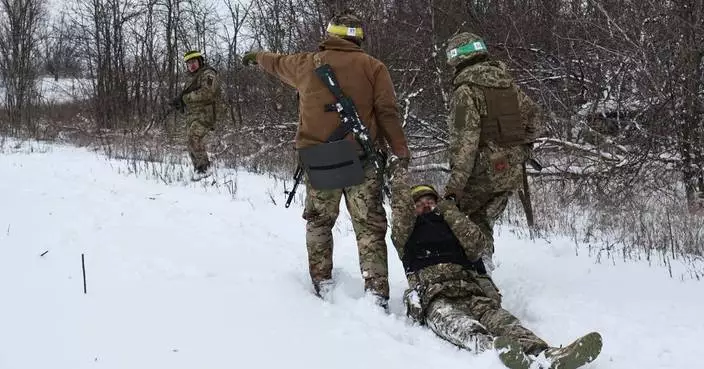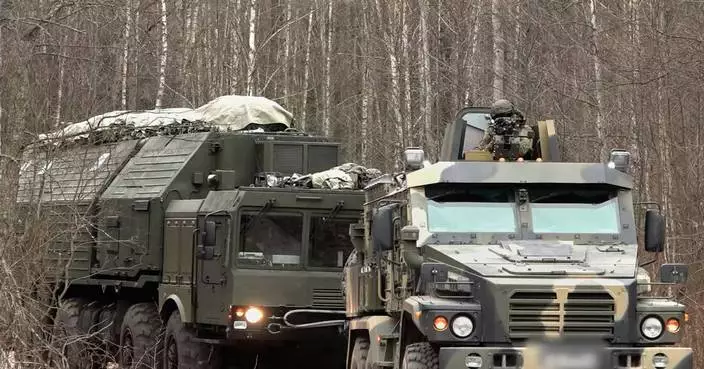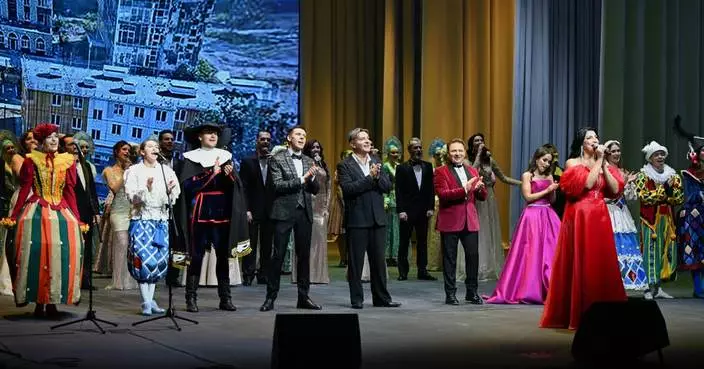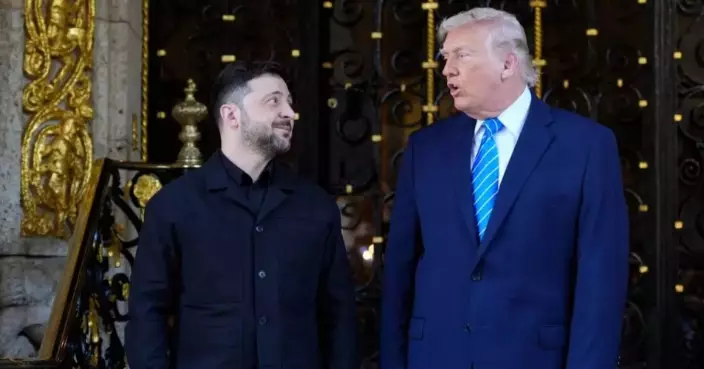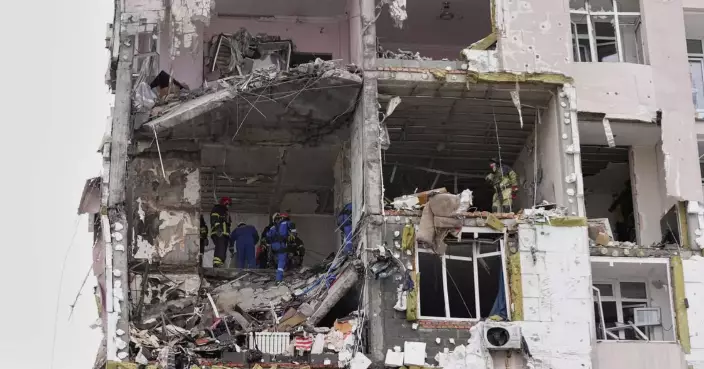Russia plans to deploy thousands of Cossacks to guard the World Cup, but the traditional paramilitary groups face criticism for their strident nationalism and attacks on protesters.
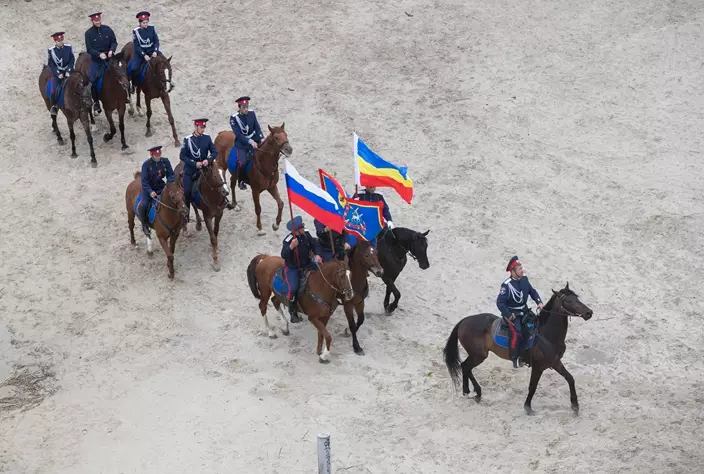
On Sunday, May 13, 2018, Don Cossacks practice on the bank of the Don River near the World Cup stadium before the Russian premier league soccer match between Rostov and Ural, in Rostov-on-Don, Russia. (AP Photo/Pavel Golovkin)
During a parade Tuesday under the hot sun of southern Russia, a politician and a police chief lectured assembled Cossacks on how to "keep order" and remain polite with foreign fans, before a priest sprinkled their ranks with holy water. They'll patrol alongside police during the World Cup in Rostov-on-Don, two Cossacks to each cop.
"They are taught in the art of war from childhood, they obey their elders and serve the motherland," Cossack elder Igor Barannikov told The Associated Press. During the World Cup, "we will help in any way to prevent any attempt at destabilization."
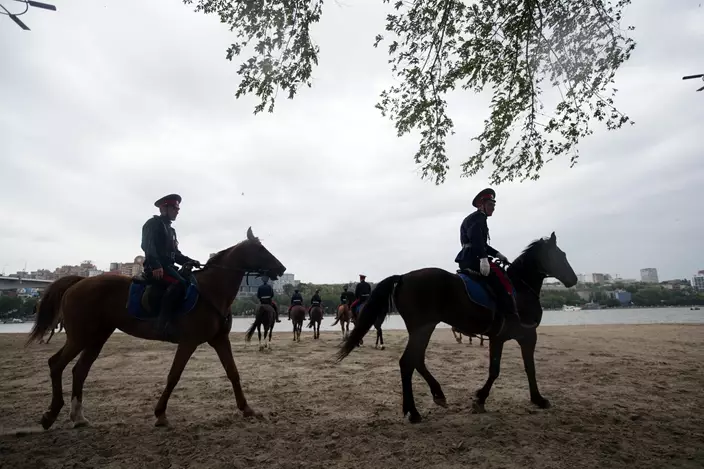
(AP Photo/Pavel Golovkin)
Authorities hope Cossacks will protect fans while adding local color. Some will wear traditional fur hats, and a group of stunt riders will perform on horseback. Cossacks generally can't arrest or fine people, but some are notorious for using excessive force.
Men in Cossack uniforms used their fists and traditional whips to attack Russians protesting against President Vladimir Putin last month in central Moscow. Police did little to stop them. At the Sochi Olympics in 2014, Cossacks whipped members of the punk protest group Pussy Riot.
Barannikov said his Cossacks would be tolerant of outsiders.
"We are happy to welcome everyone here regardless of their ethnic background and faith, regardless of their gender," he said. "We are happy for all our guests and we ask them to respect and keep to the traditions of the region and the country they are visiting."
Cossacks are often hostile to LGBT rights. Barannikov told Radio Free Europe this week that his Cossacks would report same-sex couples to police if they saw them kissing during the World Cup. His group didn't respond to AP requests to clarify the comments.
Cossacks were historically a mix between colonists and a military caste on the Russian Empire's south and eastern frontiers. After decades of Soviet persecution, groups claiming to be Cossacks have multiplied under Putin, often with government funding.
While some Cossacks trace their ancestry back to the paramilitary groups broken up by the Soviet Union after the Russian Civil War, others have more tenuous links. Recent years have seen government-backed "Cossack" groups spring up in World Cup host cities like Moscow, St. Petersburg and Kaliningrad on the Baltic Sea, far from traditional heartlands. Some have gone to fight with Russia-backed rebels in eastern Ukraine.
Cossacks' legal status varies. Some groups are official police auxiliaries but others are essentially costumed social clubs. There's little oversight for Cossacks who work with police if they face accusations of using excessive force, typically against migrants or opposition activists.
Modern Cossacks' image as Christian warriors fighting for a strong Russian state isn't always backed up by history.
Cossacks crushed protests against the czars in the early 20th century, but led several earlier rebellions when they felt their autonomy was under threat.
They sometimes allied with Muslim ethnic groups against czarist forces, while many Kalmyks — members of an ethnically Mongolian minority who mostly follow Buddhism — lived as Cossacks and were widely accepted as such until the 20th century.
In Rostov-on-Don, Cossack official Sergei Strogonov said his patrolmen are learning English phrases to talk with fans.
"We're preparing for it so we don't end up humiliating ourselves. We're learning standard phrases of greeting so that the Cossack patrol can sort things out and provide the necessary help to any foreign citizen," he said. "We want our foreign guests to have only positive memories of us both as a people and as patriots of our country, and as people who love order."
NEW ORLEANS (AP) — As National Guard members roll into New Orleans to help with safety measures ahead of New Year's celebrations, city officials are still seeking permanent security solutions nearly a year after a truck attack on Bourbon Street left 14 dead.
The rampage, in which a man drove around a police blockade in the early hours of Jan. 1, revealed security vulnerabilities surrounding a famous street filled with boisterous bars, brass bands playing on cobblestone corners and a steady stream of partygoers carrying cocktails.
While Louisiana officials say the tourist site is safe as they implement additional measures to crackdown on potential threats ahead of the attack anniversary, families of deceased victims say not enough has been done to ensure similar tragedies won't happen again.
The attack happened when Shamsud-Din Jabbar drove a pickup truck down Bourbon Street, plowing into crowds celebrating New Year’s Day, killing 14 people and injuring dozens of others. Police shot and killed Jabbar, a U.S. citizen and Army veteran who had proclaimed his support for the Islamic State militant group on social media.
In the wake of the rampage, city officials, state agencies and law firms representing victims’ families launched investigations into whether the attack could have been prevented. The investigations focused on the street's bollard system of steel columns designed to block cars from entering the thoroughfare. The bollards were being replaced at the time.
Among the victims were Nikyra Dedeaux, an 18-year-old about to start college who was on Bourbon Street with friends. Her mother, Melissa Dedeaux, told The Associated Press on Tuesday that while many will ring in 2026 with fireworks and merriment, she will be grieving. She has been haunted by her daughter's final moments, captured in graphic video that circulated on social media.
“I’m a parent that had to wake up, log on my Facebook account and see my daughter's last days — my daughter's last time. I didn’t get to see her on Bourbon the night it happened. I saw her on a video,” she told the AP.
“I saw no safety,” Dedeaux said. “I saw that my daughter could still be here.”
Questions still swirl around the street's barricade system, which is a patchwork of bollards, strategically parked police vehicles and 32 large steel barriers that officers push into place every night to form pedestrian zones.
“They are not meant to be utilized in the fashion they are,” Samuel Palumbo, the 8th District New Orleans Police Department Captain, said of the barriers that can withstand only low-speed collisions. He stressed to the New Orleans Governmental Affairs Committee this month that the system is a “temporary solution to a permanent problem.”
“We need to learn from what happened,” Morris Bart, whose law firm is representing victims and their families, told reporters Tuesday. “It’s kind of ridiculous ... that a year after this tragedy nothing has been done to resolve this situation.”
Palumbo urged the city to install permanent security gates that can withstand crashes up to 50 miles per hour (80 kilometers per hour). The committee opted to hold off on a vote until incoming Mayor Helena Moreno enters office in January.
A consulting firm, hired by the city to conduct a security assessment, made another suggestion: Make Bourbon Street a pedestrian only area.
While much of the street is limited to pedestrians at night, the recommendation — which victims' families have supported — was largely ignored after French Quarter residents and business owners raised concerns about accessing their homes and businesses.
As the city prepares for round-the-clock revelry, President Donald Trump authorized the deployment of 350 National Guard members, who were arriving Tuesday to provide enhanced security for the French Quarter.
Troops will stay through Carnival season, when tourists descend on the Big Easy to partake in costumed celebrations and parades that snake through city streets before ending with Mardi Gras in mid-February.
Republicans and Democrats have supported the additional resources. Mayor-elect Moreno said she appreciates the troops' presence and that it increases the “visibility of security assets during major events.”
Longtime French Quarter worker Miguel Thornton said he's happy to see armed troops a year after the attack.
“A lot of the service industry professionals that were out here were affected — they saw the carnage, they had to step over bodies — and so people were definitely changed,” Thornton said. “As far as the National Guard, they’ve been here before. Honestly, they’re welcome.”
Louisiana has a famous Cajun French phrase, “Laissez les bon temps rouler,” or “Let the good times roll.” In New Orleans, a city that heavily relies on tourism, the show always goes on in the entertainment district — even in the face of tragedy.
After the Bourbon Street attack, the strip was closed down as emergency crews tended to the injured, bodies were removed and blood was washed from the streets. By the next day, before all the victims had even been identified by the coroner, the street was reopened. Within a few months, handwritten tributes at the site of the attack had been painted over.
As the anniversary nears, tourists again flock to Bourbon Street for New Year's celebrations. This time, suspended above them are hundreds of handcrafted flags honoring the victims.
Buck Harley, who manages a Bourbon Street cigar shop, said he has had to explain the memorial to patrons.
“We seem to as a society forget. And I don’t think it’s because of a lack of empathy but because there’s another big story taking its place,” Harley said. “I have to tell the tourists what the flags are up there for, because it’s forgotten already.”

FILE - Emergency personnel work at the scene on Bourbon Street after a vehicle drove into a crowd on New Orleans' Canal and Bourbon Street, Wednesday Jan. 1, 2025. (AP Photo/Gerald Herbert, File)

Buck Harley, a cigar shop manager, stands outside of his store Monday, Dec. 29, 2025, on Bourbon Street in New Orleans. (AP Photo/Jack Brook)

Miguel Thornton stands under memorial flags for the victims of a Jan. 1, 2025, vehicle ramming attack, outside of the Bourbon Street bar, where he works, on Monday, Dec. 29, 2025, in New Orleans. (AP Photo/Jack Brook)

An opened gate is seen at the Bourbon Street corner in New Orleans on Monday, Dec. 29, 2025, the site of a Jan. 1, 2025, fatal vehicle ramming attack which led the city to bolster its safety measures in the area. (AP Photo/Jack Brook)









